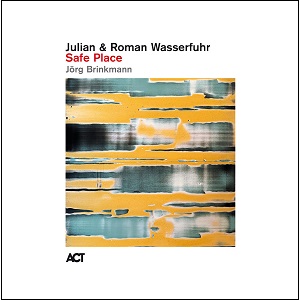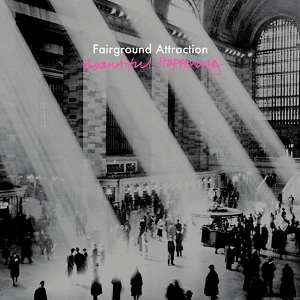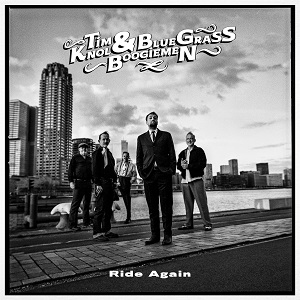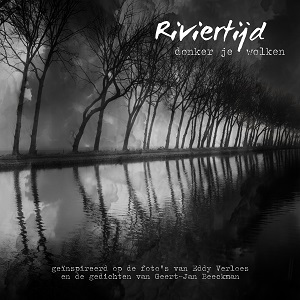Album review overview: Fairground Attraction, Nachtblut and more
Dozens of new albums arrive at Maxazine’s editorial staff every week. There are way too many to listen to them all, let alone review them. It ensures that too many albums are left behind. And that’s a shame. That is why today we post an overview of albums that arrive at the editors in short reviews.
Julian and Roman Wasserfuhr – Safe Place
The German brothers Julian and Roman Wasserfuhr are no strangers to jazz. On “Safe Place,” the brothers are joined by cellist Jörg Brinkmann and saxophonist Paul Heller. The album is meant to be a haven, a place to escape from the daily hustle and potential chaos. For this reason, they chose to record the pieces in a very intimate setting, which is audible. A fine example is “Movimiento,” where the cello and Julian’s trumpet languidly dance around each other. One of the few up-tempo pieces is “El Caballo Valiente,” introduced by piano and cello before the trumpet and saxophone take turns freely improvising. The piano is primarily accompanying in all pieces, yet prominent enough to realize that Roman’s playing sets the mood throughout, defining the ‘Wasserfuhr Sound’. The brothers have developed their signature that comes across excellently in the compositions, almost all written by Julian. Nearly – because there’s one piece that isn’t his: Sting’s “Fields of Gold”. ‘The best that young German jazz has to offer,’ wrote the Rheinische Post, as quoted in the bio. Whether the arrangement of one of Sting’s hits deserves that praise is somewhat doubtful. The song’s theme is recognizable, but around it, Julian indulges in an artificially sounding solo with far too many notes that simply don’t belong here. For those in the mood for well-executed, easy-listening jazz, excluding “Fields of Gold,” this album is indeed a haven. (Jeroen Mulder) (7/10) (Act)
Nachtblut – Todschick
The German band Nachtblut blends dark metal with classical elements, new wave, and even Western influences. This is packaged in driving rhythms, heavy riffs, and catchy, sometimes almost poppy melodies. They criticize modern social issues, with death recurring in several lyrics. “Von Hass Getrieben” has a serene, classically oriented start. Songs like “Todschick” and “Das Leben der Anderen” are fantastic to shout along to. The transitions between musical styles are sometimes quirky, as in “Stirb Langsam” which contains folk elements: this will be an amazing live experience. The same goes for “Mein Ist Die Hölle,” though it’s occasionally somewhat excessive. The clever turn toward a minimalist section in “Schneller Als Der Tod” is very surprising. Askeroth’s distinctive vocals can sometimes be slightly overpowering. The grim sound forms an interesting combination with the beautiful layered vocals/choir singing. The low vocals/narrative voice has a warm tone, while the wordless grunts are impressive. The contrasts and transitions between lighter elements and the dark music work well. “Todschick” is a unique and diverse album. (Esther Kessel-Tamerus) (7/10) (Napalm Records)
Fairground Attraction – Beautiful Happening
‘It’s got to be perfect’ – that’s how the British band Fairground Attraction put themselves on the map in the late eighties. A catchy tune that still sounds familiar today, though the band name might ring fewer bells. Shortly after, things went quiet around the group. There was a live album in 2003, and the band has recently reunited to release a third album. Many will see this as their real second album – who would have expected that after more than 36 years? Despite the musical differences that split the band, they’ve always maintained good contact and often played on each other’s solo albums. “Beautiful Happening” sounds fresh and pleasant. You immediately want to dance to songs like “Learning To Swim” and slow dance to the following “Gatecrashing Heaven”. Fairground Attraction gives us a very nice surprise with the new album. (Rik Moors) (7/10) (Fairground Attraction)
Tim Knol & Blue Grass Boogiemen – Ride Again
There’s an unusual wind blowing through the artist’s landscape. Apparently, in 2025, you need to release a country album, a trend set by Grammy-heavyweight Beyoncé. But there’s country, and then there’s country made after consuming a litre of Red Bull, several pots of strong coffee, and a bag of sour candies. That’s when you get bluegrass, where the banjo takes centre stage and everything sounds like a 33 RPM record played at 78 RPM. We love it. And so “Ride Again” by Tim Knol & Blue Grass Boogiemen hits the spot. Because as bluegrass, this is just exceptionally well done. The jazz structure, the instrumentation with mandolin, upright bass, dreadnought, and of course banjo, combined with Knol’s slightly nasal, high singing voice: works. Now, the Blue Grass Boogiemen are certainly not newcomers; in fact, the group has matured right to its American roots. The single “Up In The Hills” was already a tasty preview, of which we get thirteen songs served in just over half an hour on “Ride Again,” specially written for the group’s new theatre show. That the singer was raised with it is evident; his father was a big fan of the genre, he told NPO Radio 5. The unprecedented joy the men have while making music is contagious, with Knol notably sounding truly free. This genre fits like a glove, something he has already amply proven with this group. With “Not So Precious Memories” we’re allowed to ease in slowly, before letting loose, though listeners are granted moments of relative calm in the slower numbers and certainly in the beautiful closer “Mother The Mountain”. Furthermore, life is sung about with sometimes cynically tragic lyrics with sobs and hiccups in the right places, while the band merrily plucks and fiddles away. “Lost Lovesick Lonesome Blue” and “There Ain’t Nobody Gonna Miss Me When I’m Gone” are bluegrass classics in the making, including the characteristic harmony singing and solos. Earl Scruggs, pioneer of the way the banjo is played in bluegrass, would be happy with this. We already are. On to the theatre! (Jeroen Mulder) (8/10) (I Love My Label)
Riviertijd – Donker je wolken
With “Donker je wolken,” the Flemish duo Riviertijd, formerly known as The River Curls Around The Town, presents their project that weaves poetry, photography, and music into a beautiful whole. An album that brings together thirteen poems by Geert-Jan Beeckman with as many photos by Eddy Verloes, translated into sound by Bart Bekker and Jan Vanwinckel. After four successful English-language albums, the musicians now make the switch to Dutch, which sounds surprising. Text and vocals often remind one of perhaps the best Flemish band ever, Gorki, and that’s quite impressive. Not entirely – it’s somewhat more electronic and unfortunately often too abrupt in the outros. Yet the similarities are striking: You might as well call it Gorki in a refined mix of electronics and listening pop that is both intimate and compelling. The production sounds warm and surprisingly clear. The musical influences from Massive Attack to Daniel Lanois are still recognizable but are now blended with elements from Dutch cabaret. “Donker je wolken” proves that Riviertijd’s artistic evolution has matured further. (Norman van den Wildenberg) (7/10) (3300 RPM RECORDS / SWEET SOUNDS vzw)
![]()










